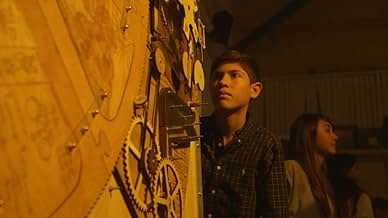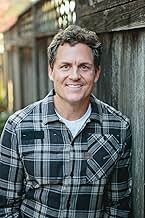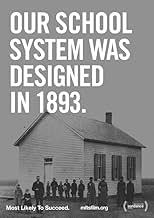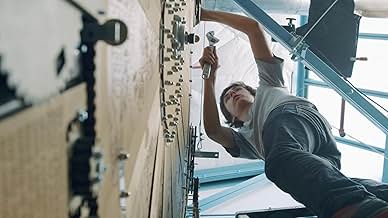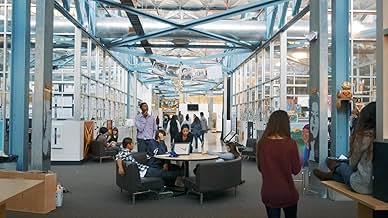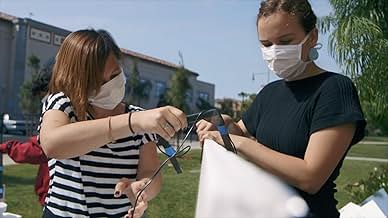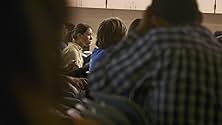Ajouter une intrigue dans votre langueA powerful documentary examining education in America and inspiring school communities to re-imagine what students and teachers are capable of doing.A powerful documentary examining education in America and inspiring school communities to re-imagine what students and teachers are capable of doing.A powerful documentary examining education in America and inspiring school communities to re-imagine what students and teachers are capable of doing.
- Réalisation
- Scénario
- Casting principal
- Récompenses
- 2 nominations au total
Avis à la une
Whats the point of makin a documentary and not making it available for free?!?
Though this 2015 movie written and directed by Greg Whiteley has gotten rave reviews, there are some serious problems. The theme is alternative education without classes, books or tests, but there is a recurring sub-theme of violence and terror under the pretext of a student play about a heroic woman named Malala Yousafzai. Unfortunately her story is not told at all, and instead there are recurring scenes of terrorists culminating in the beating of a young innocent white girl by Pakistani terrorists. For a movie that's supposed to be about progressive education in California this movie is a failure as it promotes bigotry and prejudice. The writer and director Greg Whiteley should be ashamed. Schools should not air this film and students should not be subjected to such overt prejudice reinforcing the most negative stereotypes of Muslims and Pakistanis dressed up as "progressive education."
After witnessing his daughter's frustrations with 4th grade and overhearing her teacher's rant about building character for the future, director Greg Whiteley decided to explore the current status of America's educational system and what he uncovered is quite unnerving. Essentially, this whole thing called "school" is bullshit and is based on a concept developed more than a century ago with minimal updates. Whiteley proposes the question of humans' responsibility in the future now that machines have conquered our physical and mental capabilities. It's a scary thought to say the least. The useless practice of test preparation for the SATs is brought under scrutiny since most students do not retain the information shortly after completing the examination. A light of hope arrives in the form of an alternate curriculum set in place at High Tech High. Viewers are immersed in the unconventional study lessons and atypical teacher interactions with students. Whiteley certainly acknowledges the results from this new form of education are too preliminary to make any rash decisions, but his comprehensive investigation, exciting classroom immersion, and appealing teacher interviews certainly beg for the discussion to continue far into the future. -Jimmy Martin
Greetings again from the darkness - from the Dallas International Film Festival. When people discuss the U.S. public education system, most agree (at least to a certain degree) that it's broken. The impassioned and creative debates occur over how best to "fix" it. The ideas are infinite, but as with any problem in need of a solution, it's wise to consider the desired end result. What do we need and expect of our education system? And who is "we" in that question? Are we satisfying societal needs or those of the individual
and who decides? It is not feasible to expect an 86 minute documentary to answer all of these questions and solve one of the biggest issues facing society, but skilled documentarian Greg Whiteley does his best to advance the conversation. "Teach to the test" is the widely accepted curriculum these days, and it's defined as daily lessons and assignments structured to prepare each student for the standardized tests utilized for determining a student's knowledge base, grading teacher effectiveness, ranking schools and school districts, and of course, determining the acceptability of certain students at particular colleges.
With a basic structure that has not changed in 124 years, it seems clear that our education system is not properly preparing students for a world that has changed drastically in the past 3 decades. Many make the argument that the future success of students will be determined by what are called "soft skills": confidence, ability to collaborate, creativity, time management, critical thinking, and decision making. There are interviews from managers at Google and Khan Academy stressing that these are the skills they already seek in new hires.
There are defenders of the current system. They claim it's all part of the game we play, and that students must survive the grind just as their parents and their grandparents did. Opponents say students are being treated as data points, not people or future contributors. Whiteley takes us inside of High Tech High in San Diego. It's an experimental campus committed to finding new ways to teach, so that students learn and retain and accomplish. One of their most impactful evaluation points come from group projects that are presented to faculty, parents and the community. It's fascinating to watch the students work towards their goal, and equally interesting to hear the parents talk about personal growth of the students.
Whiteley includes the spot on quote from John Dewey: "If we teach today's students as we taught yesterday's, we rob them of tomorrow". Though the film doesn't touch on the highly charged political landscape or the importance of teacher education and preparation, it is quite effective in generating thought and discussion about what responsibility we have towards students, and how we can improve the odds that they will grow into contributing members of society. For more information on the film, or to schedule a screening at your school or organization, go to www.mltsfilm.org
With a basic structure that has not changed in 124 years, it seems clear that our education system is not properly preparing students for a world that has changed drastically in the past 3 decades. Many make the argument that the future success of students will be determined by what are called "soft skills": confidence, ability to collaborate, creativity, time management, critical thinking, and decision making. There are interviews from managers at Google and Khan Academy stressing that these are the skills they already seek in new hires.
There are defenders of the current system. They claim it's all part of the game we play, and that students must survive the grind just as their parents and their grandparents did. Opponents say students are being treated as data points, not people or future contributors. Whiteley takes us inside of High Tech High in San Diego. It's an experimental campus committed to finding new ways to teach, so that students learn and retain and accomplish. One of their most impactful evaluation points come from group projects that are presented to faculty, parents and the community. It's fascinating to watch the students work towards their goal, and equally interesting to hear the parents talk about personal growth of the students.
Whiteley includes the spot on quote from John Dewey: "If we teach today's students as we taught yesterday's, we rob them of tomorrow". Though the film doesn't touch on the highly charged political landscape or the importance of teacher education and preparation, it is quite effective in generating thought and discussion about what responsibility we have towards students, and how we can improve the odds that they will grow into contributing members of society. For more information on the film, or to schedule a screening at your school or organization, go to www.mltsfilm.org
Why aren't people finding jobs? Even those with college educations? Because they are not prepared for the world that has rapidly changed in less than a generation. Knowledge is now, simply, a google away. But skills like collaborative thinking, stamina, work ethic, critical thinking, reliability, resilience are often overlooked and lacking. How to develop these skills is renegade science in this film. This film provides important subject matter for anyone who values the future world for their children. Provocative and arresting. I highly recommend this film.
Okay, in order to have this review accepted I have to write at least 10 lines. How to say the same thing in different words? The rote "knowledge" we traditionally teach in schools is completely outdated. In fact, it is mind-numbing and often crushes a desire to learn. Our current system was designed for a world that is passé.
Okay, in order to have this review accepted I have to write at least 10 lines. How to say the same thing in different words? The rote "knowledge" we traditionally teach in schools is completely outdated. In fact, it is mind-numbing and often crushes a desire to learn. Our current system was designed for a world that is passé.
Meilleurs choix
Connectez-vous pour évaluer et suivre la liste de favoris afin de recevoir des recommandations personnalisées
Détails
- Date de sortie
- Pays d’origine
- Langue
- Société de production
- Voir plus de crédits d'entreprise sur IMDbPro
- Durée1 heure 26 minutes
- Couleur
Contribuer à cette page
Suggérer une modification ou ajouter du contenu manquant

Lacune principale
By what name was Most Likely to Succeed (2015) officially released in Canada in English?
Répondre
